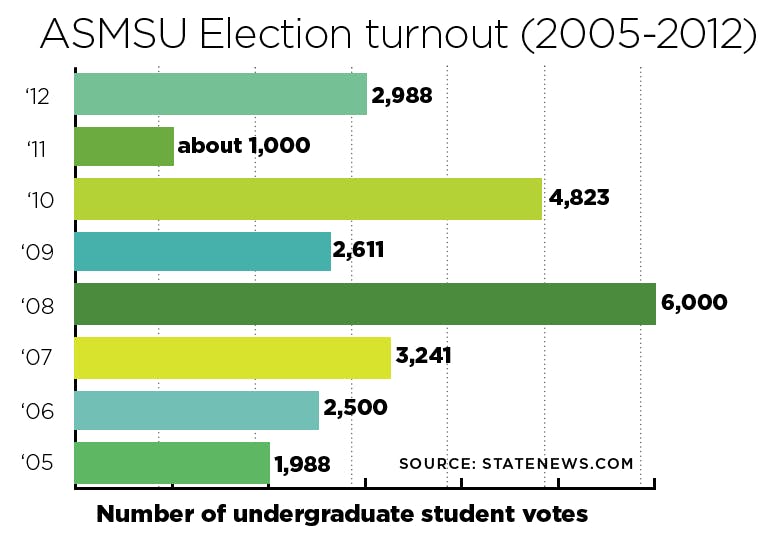When the title of ASMSU, the undergraduate student government, is brought up across the nearly 37,000 undergraduate students, the average student might answer the question with ‘Are those the concert guys?’ or give a response similar to supply chain management freshman Brandon Griffith — “I know absolutely nothing.”
But ASMSU is hoping to change that next week.
With elections starting next Monday, ASMSU will garner more attention from students, such as Griffith, but how many students are aware of the services provided or that they are funding both the group’s services and paychecks out of their own pockets? Last year, less than 10 percent of undergraduate students voted during election week.
Based off Griffith’s comments and other students’ responses, it appears there might be a substantial amount of students who refer to the undergraduate student government as
ASMS-who?
Where does your money go?
ASMSU is supported by the undergraduate student tax, which provides the student government with $18 per student per semester.
With these funds, ASMSU provides a handful of services, such as entertainment, legal services, bluebooks and newspapers.
The undergraduate student government also uses tax funds to pay the yearly salaries for the executive staff. All of ASMSU’s employees are paid from the student tax, said ASMSU’s President Evan Martinak. Legislative representatives, who make up ASMSU’s general assembly, are not considered ASMSU employees and are unpaid.
The president is the highest paid position, with a yearly salary of $9,360, and the six vice president positions and chief of staff are the second highest salaries, allocating each position $7,992 yearly, according to ASMSU salary reports.
While Martinak confirmed the salaries haven’t increased in the past four years, supply chain management sophomore Colton Rupp changed his tone toward the student government after finding out his money goes toward paying a peer.
“It kind of changes now,” Rupp said. “If the money was benefiting us, like if it was going into us, I’d be okay with it. If the university paid them, then I’d be okay.”
Why no love?
It is no secret ASMSU can be overlooked by many undergraduate students across campus, and Martinak understands some students don’t have time to recognize the organization’s efforts.
“As undergraduate students, we have a lot going on,” Martinak said. “All students gravitate to their own little spheres on campus, so maybe some of the things ASMSU (does isn’t) immediately relevant to what it is going on in their lives.”
Martinak said while ASMSU’s benefits might not be constant for students, in the long run they can prove to be relevant and important.
State Rep. Sam Singh, D-East Lansing, a former ASMSU chief of staff, understands the challenge of reaching out to students. Singh said not only was connecting with students difficult during his time with ASMSU in the early 1990s, but sees similar issues at the local and state level in connecting with constituents.
“That was always a challenge with ASMSU,” Singh said. “It’s no different from local governments and state governments. I think these are natural issues for those organizations who (are) representing their community.”
ASMSU is shooting to improve upon last year’s 8.7 percent undergraduate student-voter turnout, with plenty of emphasis on getting as many students to the polls as possible next week. The group has planned a meet-and-greet carnival for Sunday afternoon to kick off election week.
“There is a belief out there amongst some people, that the greater the vote turnout, the more representative or legitimate the student government is of the student body,” Martinak said.
What can ASMSU do for you?
Support student media!
Please consider donating to The State News and help fund the future of journalism.
While ASMSU might not be as well-known to the average student, university officials said the organization has a strong impact on creating change at MSU.
ASMSU has built a strong relationship with the Office of the Provost, holding meetings each month. The two have worked together on numerous bills, including the preferred student name policy that was implemented this semester.
“We have a mature governance system here where the role of undergraduate and graduate students is both recognized (and) actually really respected,” Acting Provost June Youatt said. “I’ve been doing this where prequel questions are ‘Have the students been consulted, how did the students react, have students seen this?’ So, I think in our university it really has become part of the fabric of our place.”
MSU Trustee George Perles said he gets the chance to personally meet with the student government leaders before every board meeting for breakfast to discuss issues.
Perles considers the student organization to always be sharp and he takes their concerns seriously, he said.
“They are very important,” Perles said of ASMSU. “That’s all it’s about, what the students are doing. The number one priority is always the students.”
Discussion
Share and discuss “ASMS-who?” on social media.







